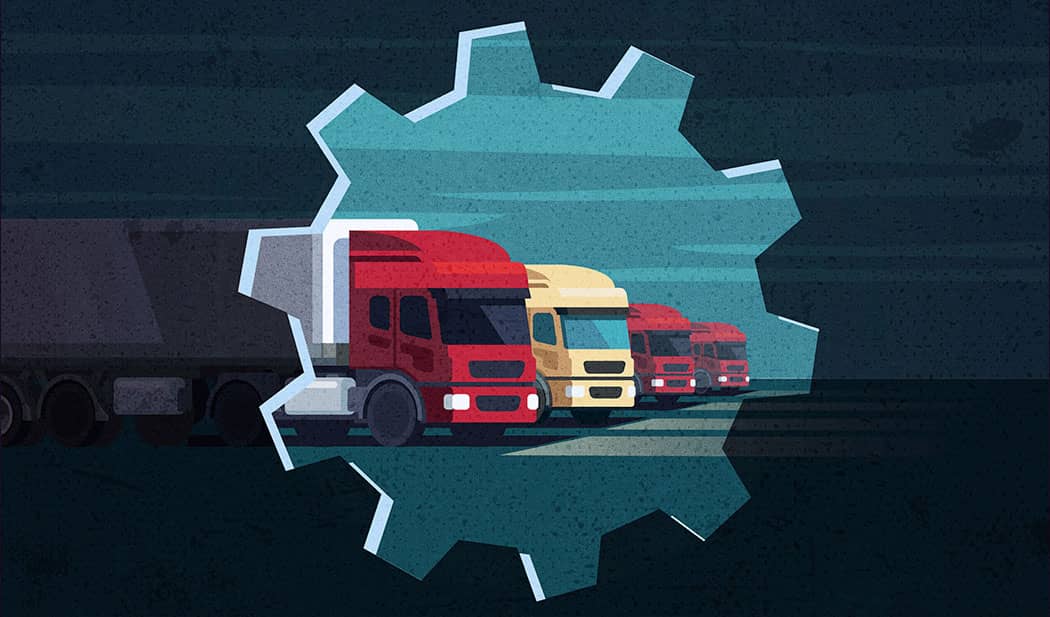Everything you need to know about fleet management.

No aspect of the U.S. transport industry is more prominent than trucking—in fact, nearly 1.5 million for-hire and private fleets have FMCSA registration. But while today’s heavy-duty fleets may be more advanced than ever, they can’t take care of themselves. Instead, you’ll need to take the well-being of your commercial fleet seriously by prioritizing fleet management.
But what is fleet management, anyway? Is it a dog breed, or a comprehensive approach to maintaining and protecting your commercial fleet, or a type of sandwich? Read on to learn which of these answers is correct, along with everything else you need to know about this critical topic.
What Is Fleet Management?
Merriam-Webster defines the word “fleet” as “swift in motion.” Thus, the term “fleet management” clearly refers to a management style that prioritizes fast-paced work, such as-

Sorry, wrong definition. In reality, fleet management is the process of keeping your fleet in working order while avoiding potential problems. But while this definition might sound straightforward, the job it describes is anything but.
How Does Fleet Management Work?
A successful fleet management plan focuses on three major priorities:
- Keeping your fleet safe
- Complying with governmental regulations
- Enforcing company rules
While these are the key elements of fleet management, they aren’t the only priorities involved in this work. Fleet management professionals also increase productivity and efficiency whenever possible, balance a “big-picture” view of the fleet with a thorough understanding of the fine details, and stay up-to-date with technological developments in the industry. Like we said: not a simple job.
Why Is Fleet Management so Important?
Without fleet management, your commercial fleet simply won’t be able to succeed. After all, fleet management involves everything from handling maintenance work to ensuring compliance with safety regulations. No company that partially or fully relies on heavy-duty vehicles can afford to ignore fleet management.
What is a Fleet Manager?
Fleet management is an in-depth job, which is why it’s typically handled by dedicated professionals known as “fleet managers.” Today’s fleet managers are responsible for countless tasks, including:
Vehicle Acquisition
Fleet managers may or may not be responsible for actually building a fleet from square one. But even if they don’t have to create an entire fleet, they’ll need to buy and sell individual trucks at least once in a while—and they’ll need to determine when doing so is necessary.
When the time comes to buy one or more new vehicles, fleet managers will have to consider details like the types of loads their new truck will haul, the features and options available from various truck manufacturers, and where their new vehicle will typically travel. Before agreeing to purchase a truck, fleet managers will negotiate for a lower price and may request input from other people in their company.
Designing and Managing Fuel Programs
Fuel is a significant expense for any fleet. But while fleet managers are responsible for creating fuel budgets, diesel costs can vary quite a bit over time—making this a more difficult task than you might assume.
In some cases, fleet managers go with on-site fueling for their fleets. That strategy can increase fleet efficiency while allowing for lower prices per gallon, as it’s broadly comparable to buying fuel in bulk. But fleet managers also have to negotiate prices for on-site fuel, which means going through a bargaining process whenever contracts are up. To avoid this, fleet managers may opt for other money-saving strategies like signing up for a preferred network or establishing a fleet card program.
No matter what your fleet’s fuel program looks like, it must be carefully thought out to ensure you get the best possible results. The best fuel programs are based on hard numbers in the form of fuel efficiency tracking. By tracking fuel efficiency across your fleet and for each of your trucks, you can get a clear picture of your fleet’s fuel needs (and catch issues like tire inflation problems, engine performance trouble, aggressive driving habits, and excess idling early on).
Designing and Managing Maintenance Programs
Every day, the average heavy-duty truck deals with more than just a bit of traffic. These are hard-working vehicles designed to withstand demanding conditions, but they can’t deal with this level of pressure over the long term without regular repair and maintenance work.
To design a high-quality maintenance and repair program, fleet managers must consider factors like use cases, vehicle types, and industry/manufacturer standards. These programs should also cover everything from “standard” maintenance tasks (i.e., changing filters, fluids, and belts) to jobs like windshield repair/replacement, tire rotation and replacement, and warranty recalls.
Of course, designing an exceptional maintenance and repair program is only half the battle. Since scheduled maintenance allows mechanics to identify and resolve issues requiring repair work, fleet managers also need to ensure their entire fleet is ready to stick to their new program. If a single truck misses a single preventive maintenance appointment, that truck will have an increased risk of breaking down.
Leading Safety Programs
In the world of fleet management, “safety first” isn’t just a saying. Prioritizing drivers’ health and your fleet’s condition is a crucial part of any fleet manager’s job. While serious accidents can have a financial impact on your fleet, an accident can also damage your company’s brand, public trust in your organization, and internal team morale.
Pre- and post-trip inspections are a requirement for all fleets operating in the United States. That might sound like a hassle, but checking vehicles’ engines, taking care of gauge readings, and performing visual inspections are effective ways to avoid unexpected breakdowns—and save money in the long run.
Fleet managers also need to establish the safety rules their drivers will follow while on the job. Sticking to predetermined routes, using safety belts, and avoiding hard braking and speeding when possible might seem like common-sense requirements, but it’s important to make these rules clear. Beyond their impact on driver safety, violations of these rules can shorten vehicle lifespans, cause your insurance costs to go up, and impact fuel usage.
Years ago, enforcing rules like these would have been nearly impossible. But today, GPS capabilities can let fleet managers know when a truck has gone off-route or broken other safety rules.
Tracking Fleet Metrics
Technological advances like smart trailers have also given fleet managers new ways to track their fleets. Today, these people can track entire fleets and individual trucks in real time with GPS tracking systems, navigation programs, telematics, and onboard video monitoring systems. By using these technologies, fleet managers can know where each truck in their fleet is located, whether or not a truck is on schedule, and what road/weather conditions each driver is dealing with.
Good fleet management also requires keeping track of the repair and service history of each truck in their fleet (a duty that has quite a bit of overlap with the maintenance and repair work they are responsible for). Closely monitoring individual vehicles’ repair and maintenance needs can help fleet managers schedule vehicle downtime as efficiently as possible while keeping their fleet in the best possible condition.
Understanding and Managing Compliance
As Forrest Gump once said, “[Governmental regulatory standards for commercial fleets in the United States are] like a box of chocolates. You never know what you’re gonna get.”
Okay, perhaps that’s a slightly paraphrased version of that famous quote—but the point is, it can be hard to keep up with the constantly-changing rules fleets are required to follow.
For an example of these difficulties, look no further than the ELD mandate introduced in 2017. This mandate required fleets to use electronic logging devices for added accuracy and a lower risk of drivers exceeding their maximum hours.
Along with ELD compliance, fleet managers are responsible for ensuring their fleets comply with regulations on what they haul, their stopping distance, and how much they weigh. Since most of these standards are intended to keep people safe, meeting them can help fleet managers strengthen their safety programs.
Vehicle Remarketing
Fleet managers also have a great deal of work to do when selling vehicles. That includes the work they put into cleaning and maintaining trucks, as used vehicles that are still in good condition have a higher resale value than those that are in rough shape. To accomplish this, fleet managers should promote safe behavior among their drivers, keep up with repairs, and track their fleet’s preventive maintenance needs.
Benefits of Fleet Management Systems
GPS tracking systems, ELDs, and the other technologies mentioned above can make your fleet manager’s job much more manageable. In addition to this hardware, you’ll need a program that can tie everything together. Investing in the right fleet management system can completely transform your approach to managing your commercial fleet.
With a well-designed fleet management system that has the features you need, you’ll be able to:
- Always know what’s going on with the trucks in your fleet
- Maximize uptime across your fleet
- Make your business more efficient than ever
- Increase profitability
How to Choose the Right Fleet Management Solution
Here’s a weird comparison for you: investing in a fleet management solution is like deciding where to go to dinner. Sure, eating at the buffet place that serves every imaginable type of food can be tempting. But when you get there, the quality of that food might not match your expectations.
The same mindset applies to your fleet’s software needs. “One-size-fits-all” programs might look appealing, but there’s a good chance they won’t have all the features you want. Instead, take the “best of breed” approach—look for several programs that excel at their given tasks instead of a single piece of software attempting to do it all.
Key Features of Fleet Management Software
Along with programs for route planning, GPS, and fleet tracking, fleet management software is crucial for any modern-day fleet. Your fleet management program of choice should deliver:
- Service order workflows. Even the most well-meaning mechanics can occasionally miss a step while working on trucks. Today’s leading fleet software can provide step-by-step service guides, all but eliminating this possibility.
- GPS integration. The best way to schedule preventive maintenance is to let your software do it for you. If your fleet management software can work with your GPS, it can help you keep track of engine hours and miles—and let you know when your trucks can use some work.
- Straightforward reporting. Your fleet manager needs reliable numbers to base their decisions on. Intuitive reporting can help them understand your fleet’s cost of ownership at a glance, quickly generate batch reports, and even analyze individual technicians’ efficiency and productivity.
- Inventory management capabilities. Manually keeping track of parts can be a hassle, especially if you have multiple locations to keep up with. Make sure your software solution can give you constant updates on your inventory and help simplify the process of ordering new parts.
See the Fullbay Difference For Yourself
Fleet management includes a lot—and we really mean a lot. Trying to handle everything yourself isn’t impossible, but it certainly helps to arm yourself with the right fleet management software for the job. In fact, you may end up using more than one software solution.
Fullbay specializes in the maintenance side of fleet management, from guiding technicians through comprehensive inspections to keeping track of upcoming PMs. Integrate with GPS to track miles and engine hours, analyze technician productivity and efficiency, run batch reports, estimate the total cost of ownership, and so much more.
We can’t do everything—like help with route planning, for example—but we can do a lot. Which means you don’t have to carry that workload yourself anymore.
The next time somebody asks “what is fleet management?,” you’ll have the perfect answer: “something Fullbay can help you with.” Find out exactly why Fullbay is the right choice for your fleet by scheduling a demo today!

